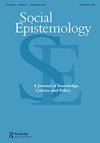信息混乱时代信任的社会指标
IF 2
2区 哲学
Q1 HISTORY & PHILOSOPHY OF SCIENCE
引用次数: 1
摘要
专家知识定期为个人和公民决策提供信息。为了决定信任哪些专家,普通公众——包括政策制定者和其他领域的专家——使用不同的认知和非认知线索。像诚实这样的认知线索,比如专家对利益冲突的坦诚,是理解人们如何评估和决定哪些专家值得信任的一种流行方式。然而,许多其他的认知线索,如来自专家的支持信息的证据,是外行公众无法获得的。因此,外行公众同时在他们的环境中使用二阶社会线索来告知信任的决定。这些二级社会线索,或“信任的社会指标”,可以防止外行公众盲目信任。因此,信任的社会指标告知了普通公众的认知警惕,或对专家证词的持续低水平监测。本期特刊探讨了科学专家和机构信任的社会指标的性质、获取和应用。它还提出了对非专业公众的信任类型的问题,并通过对态度、价值观和经验的研究,挑战了关于科学与非专业公众之间关系的传统规范假设。该问题以描述性的方式重新审查了机构的结构、它们的作用和传递信息的方法,以及社会指标在危机时期的运作方式。在这本作品集中,我们将历史、科学、科学哲学、科学技术研究、科学传播和社会认识论联系起来,拓宽了对专家信任的论述,更准确地反映了信任是一种不完美但不可或缺的努力。本文章由计算机程序翻译,如有差异,请以英文原文为准。
Social Indicators of Trust in the Age of Informational Chaos
ABSTRACT Expert knowledge regularly informs personal and civic-decision making. To decide which experts to trust, lay publics —including policymakers and experts from other domains—use different epistemic and non-epistemic cues. Epistemic cues such as honesty, like when experts are forthcoming about conflicts of interest, are a popular way of understanding how people evaluate and decide which experts to trust. However, many other epistemic cues, like the evidence supporting information from experts, are inaccessible to lay publics. Therefore, lay publics simultaneously use second-order social cues in their environment to inform decisions to trust. These second-order social cues, or ‘social indicators of trust’, prevent lay publics from having to trust blindly. Social indicators of trust therefore inform lay publics’ epistemic vigilance, or constant low level-monitoring of testimony from experts. This special issue examines the nature, acquisition and application of social indicators of trust for scientific experts and institutions. It also raises questions about the types of trust asked of lay publics and challenges traditional normative assumptions about the relationship between science and lay publics through study of attitudes, values, and experiences. The issue descriptively re-examines the structure of institutions, their role and methods for ferrying information, as well as how social indicators operate in times of crisis. In this collection of works, we bridge history, science, philosophy of science, science and technology studies, science communication and social epistemology, to broaden the discourse on trust in experts and more accurately reflect the imperfect yet indispensable endeavour that trusting is.
求助全文
通过发布文献求助,成功后即可免费获取论文全文。
去求助
来源期刊

Social Epistemology
Multiple-
CiteScore
2.60
自引率
17.60%
发文量
60
期刊介绍:
Social Epistemology provides a forum for philosophical and social scientific enquiry that incorporates the work of scholars from a variety of disciplines who share a concern with the production, assessment and validation of knowledge. The journal covers both empirical research into the origination and transmission of knowledge and normative considerations which arise as such research is implemented, serving as a guide for directing contemporary knowledge enterprises. Social Epistemology publishes "exchanges" which are the collective product of several contributors and take the form of critical syntheses, open peer commentaries interviews, applications, provocations, reviews and responses
 求助内容:
求助内容: 应助结果提醒方式:
应助结果提醒方式:


